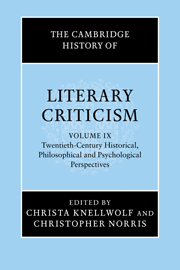Book contents
- Frontmatter
- Introduction
- HISTORY
- MARXISM AND POST-MARXISM
- FROM CULTURAL POETICS TO CULTURAL STUDIES
- PSYCHOANALYTIC APPROACHES
- GENDER AND SEXUALITY
- COLONIALISM, POST-COLONIALITY, NATION AND RACE
- MODERNITY AND POSTMODERNISM
- PHILOSOPHY, AESTHETICS AND LITERARY CRITICISM
- INTERDISCIPLINARY APPROACHES
- 29 Literature and theology
- 30 Literary theory, science and philosophy of science
- Bibliography
- Index
- References
29 - Literature and theology
from INTERDISCIPLINARY APPROACHES
Published online by Cambridge University Press: 28 March 2008
- Frontmatter
- Introduction
- HISTORY
- MARXISM AND POST-MARXISM
- FROM CULTURAL POETICS TO CULTURAL STUDIES
- PSYCHOANALYTIC APPROACHES
- GENDER AND SEXUALITY
- COLONIALISM, POST-COLONIALITY, NATION AND RACE
- MODERNITY AND POSTMODERNISM
- PHILOSOPHY, AESTHETICS AND LITERARY CRITICISM
- INTERDISCIPLINARY APPROACHES
- 29 Literature and theology
- 30 Literary theory, science and philosophy of science
- Bibliography
- Index
- References
Summary
Introduction
The specific and identifiable movement in literary criticism which might be referred to as ‘literature and theology’, or ‘literature and religion’, developed in western Christian cultures during the second half of the twentieth century. This is not to claim that there are no other, equally important approaches to the relationship between religious discourses and works of literature, or that such relationships cannot fruitfully be explored in non-Christian contexts. Neither is it to obscure the extent to which Christian interpretive practice has been questioned and complicated in encounters with other traditions. It is merely to observe that a set of theological discourses are historically and culturally interwoven with literary criticism in the Christian west, and that this coalescence has shaped a discernible critical movement in the last fifty or sixty years.
I would argue that the peculiar relationship between the study of literature and Christian theology in the west is a context coterminous with what Jacques Derrida refers to as the theological age of the linguistic sign: in Christian cultures, language has been thought to encode the divine sanction implied in the creation of the world by the Word or logos: ‘God said “Let there be …” And there was …’ In this epoch, the combining of theos and logos in its very name predisposes theology toward the study of language, and literary criticism towards theology. The deconstruction of ‘logocentric’ modes of thought (i.e., those discourses which seek to provide texts with fixed, determinate meanings) raises questions of particular difficulty for critical practices which incorporate a religous lineage and commitment.
- Type
- Chapter
- Information
- The Cambridge History of Literary Criticism , pp. 387 - 400Publisher: Cambridge University PressPrint publication year: 2001

